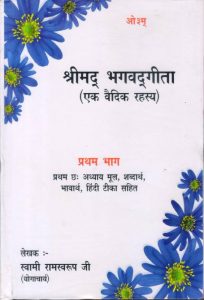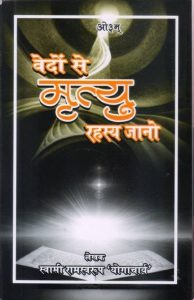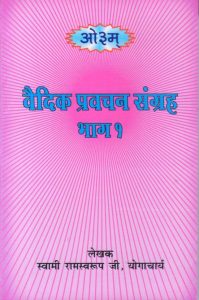State of women in ancient times
Nature cannot be changed. When man or woman take birth then they are suppressed to bear the or to face the result of past deeds (karmas). But when a person really worships God and study Vedas then he burns all the previous deeds to face and nature of the soul appears.
Maha Mritunjaya Mantra (Yajurveda 3/60 & Rigveda 7/59/12)
This mantra is mentioned in Yajurveda chapter 3 mantra 60 and Rigveda mandal 7 sukt 59 mantra 12. The mantra is "TREYAMBAKAM YAJAMAHE SUGANDHIM PUSHTIVARDHNAM URVARUKMIV BANDHNANMRITYORMUKSHIY MAMRITAT" (Rigveda 7/59/12). Meaning: Sugandhim = having fame,...
Who should be considered next to GOD?
In Shatpath Brahmin Granth 3/7/3/10, written by Yask Muni it is said, "VIDWANS HI DEVAHA" i.e., he who is learned of Vedas, he is called Dev. Yajurveda mantra 40/3 says, "ASURYA NAAM TE LOKAHA ANDHEN TAMSA VRITAHA_______" means while taking birth a child is called "Manushya" i.e., mankind. If he learns Vedas, does pious deeds and discharges his moral duties well and according to Vedas then he becomes Dev. Otherwise asur i.e., devil (demon), one who kills the pure voice of soul and does sins.
Adwaitvad – questions and answers – July 03, 2004
Swamiji’s previous reply: So first to be a learned of Vedas and knower of five fires or a sanyasi who lives in a dense jungle and does worship with trust, is necessary.
Ram Suri present reply: Living in a dense jungle for worship of divine with trust is not necessary please.
Swami Ram Swarup: To come to truth the proof of Vedas is necessary (Rigveda mantra 1/55/4 and Yoga shastra sutra 1/7). Sutra 1/15,16 of Yoga shastra wants asceticism and who is ascetic he leaves everything. His senses are controlled. If any body on the earth is ascetic in accordance with the said Yoga shastras sutra and Ved mantra, he is adorable otherwise there remains only matter of talking as said in sutra 1/23 and Keno Upanishad shlok 4/8. So please quote every time the proof of Ved mantra in support of your views, which has, yet not been done by you. So Please quote any Ved mantra where asceticism or going to jungle has not been accepted by a sanyasi as said in Br. Up.6/2/15 also. Previously I quoted Br. Up. 6/2/15 that a sanyasi has to go to jungle. On study of the said Upanishad, it is a requirement of Upanishad and not mine but I accept the requirement of Upanishad. Vedas have told four ashram, brahmacharya, grisath, Vanprasth and Sanyas . Amongst the same, only gristhashram used to be situated in cities and remaining in jungle. Shri Krishna attained Vedas’ education in jungle in Sandeepan Rishi’s Gurukul. Shri Ram used to go on the bank of river Saryu in lonelyjungle to the ashram of Vashisth Muni. Every Gurukul for the last one Arab and more than 96 crore years i.e., up to Mahabhart period was situated in jungle and aspirants used to go to jungle to the Gurukul to take education not of holy Upanishad, Geeta, shastra,Ramayana, etc., but of Vedas only because at that time these holy books had not been written. So this tradition if has been changed at present, it makes no difference to the culture but has changed the views of ancient and eternal Indian religious paths by those who are not serious about Vedas’ path i.e., their own way and they are free for the same too. So it is, even now, necessary to go to jungle if there is any Gurukul situated there, if not, then anybody can go anywhere to get the Vedas’ knowledge.
Ram Suri: Please note that Lord Krishna did not teach Gita to some one who lived in dense jungle. In other words..
Swami Ram Swarup: Vyas Muni did tapsya in a lonely jungle and in island called Krishan Dweep but after getting salvation he spread it amongst Raj Rishis like Pandavas etc., in cities also and so is the case of Shri Krishna who got Vedic education in a jungle and taught Geeta in city.
Ram Suri: it is not that where you are living, but it is how you are living’, that is required for worship of divine.
Swami Ram Swarup: I had been living in dense jungle and I have still made my ashram in jungle in 1979 as yet it is a backward area in spite of some improvement by Govt. Where I lived and am living now normally snakes and wild creatures are seen here. But I am not aware of you as to where you live because you may be satisfied with your living please. As regards computer, it is functioning by my disciple about 500 km away from me. As far as my disciples are concerned they are happy satisfied with the Vedic culture and I need not to quote anything about them. They respectfully and pleasantly come to me to get Veda and yoga education, from abroad also, but I do not try to go to them now.
Ram Suri: Sri Rama Krishna Parama Hamsa did not read Vedas nor did he live in dense jungle nor did he practice astange yoga.
Swami Ram Swarup: I never thought about Shri Ramakrishna Paramhansa and Gandhi ji but if you say that they got salvation, it may be correct at your end please. Because I have no time to check salvation of others. But I respect all.
Ram Suri: But he is the great person who experienced divine. Similarly, Mahatma Gandhi did not live dense jungle nor read Vedas nor practiced astanga yoga. But he also got salvation. How do we know that he got salvation? He died by uttering of divine’s name, and as per Gita 8/5 he got the salvation. How he got divine’s name suddenly at the time of sudden death? He remembered divine’s name at all the time. In other words, his mind is always tuned to divine, but his hands are in the society, meaning that even though he is discharging his karma, he is doing so for the sake of divine, and thus able to remember divine at the time of sudden death also. From the above two examples, it is clear that one does not need to be in dense jungle in order to have faith and worship divine.
Swami Ram Swarup: So this is your own view to deny jungle or a lonely place or a sanyasi and ascetic, which is but natural and Vedas do not deny the same. But if in cities it is possible to realize God according to Vedas. Then it is okay please. Because now a days it is beyond imagination that anybody will go to jungle yet on this pious land of India the jungles are still used by some ascetics for meditation.
Ram Suri: If you are still not convinced with the above examples, then I would like to ask few simple questions. Is your ashram located in dense jungle also? It will be difficult for me to imagine, as it is difficult to have Internet access in your ashram indense jungle in India. Do all your disciples know Vedas and five fires? Where do they live? Do they live in dense jungle or do they live in towns or cities in India? When you are saying that living in dense jungle is required for reading of Vedas or worship of divine, then I believe that you also preach the same thing to your disciples also. Right? If so, then do they live in dense jungle, read Vedas, practice astanga yoga and five fires? Can you answer me please? Reading Vedas and practicing of astanga yoga is good. But it does not mean that they are essential for attaining salvation. Criteria for achieving salvation does not depend whether some one read Vedas or not.
Swami Ram Swarup: Study of Vedas and practicing ashtang yoga is not only good but the best and supreme as said in four Vedas, six shastras, Brahmin Granth and Mahabhart. Our ancient Rishis Munis did not know about Geeta, Ramayana, and shastras etc., they knew only Vedas and ashtang yoga. After getting the knowledge they wrotethe said holy books afterwards. So the existence of said holy books are based on Vedas but Vedas are not based on these holy books. As is clear from Geeta shlok 3/15 and Manusmriti 2/6 also. And there is no its alternative. But these views are not shouldered toyou please. This is mere discussion. You and I am free to tell anything but the discussion will be having truth if is tallied with Vedas.
Ram Suri: Thus in Mundaka Up. 1.1.5, it is rightly said that the knowledge of Vedas comes under lower category (apara vidya).
Swami Ram Swarup: In Mundak Upanishad 1/1/4 it is too said that PARA and APARA Vidya both are to be known and in Mundak Upanishad it has never been said anywhere, as you said, ” that the knowledge of Vedas comes under lower category”. Not this Upanishad but not any Upanishad or shastra or any ancient Brahmin Granthetc., can use the said insulting words against the God given knowledge of four Vedas (Yajurveda mantra 31/7, Atharvaveda mantra 4/1/1 and 10/7/20, Saamveda mantra 373 and Rigveda mandal 10 and even Geeta shlok 3/15 refers that Vedas are emanated direct from God.). But I already told that everybody is free to say anything please. So these views are not shouldered to you please.
Ram Suri: Similarly, Lord Krishna in Gita 11/53 says that divine realization cannot be achieved by reading Vedas etc. but can only be achieved by exclusive devotion for divine (11/54).
Swami Ram Swarup: As regards Geeta shlok 11/53, 11/54 please send full meaning thereof to comment specially on word TATVENA PRAVESHTU and MAT KARAMKRIT MATPARMAHA In Mahabhart Vyas Muni says that Bhisham Pitamahateaches Yudhisthar that O! Yudhisthar —1.if someone ignore and insult the Vedas then he can never realize God, he who follow the preach of Vedas and does pious deeds according to Vedas, he only attains God. (Shanti Parv 20/17)
O! Yudhisthar the two shapes of God must be understood,1. Shabad Brahm (knowledge of Vedas) 2. Par Brahm ( realization). And he who is a philosopher of Shabad Brahm ( Vedas) he only realizes God. ( Shanti Parv 53/20)
So the meaning of shlok of Mundak- Upanishad cited above is that PARA and APARA both Vidya must be attained. Then based on the APARA (Shabad Brahm), the God (PARA Vidya) is realized.
Ram Suri: See, Narad ji read all Vedas and other scriptures, but he did not get peace of mind (which is possible only by divine realization). Thus, Narad ji approached sri Sanat Kumar and got enlightened by him. For discussion between Sri Sana Kumar and Narad ji, please see Chh. Up. 7.1 onwards. Therefore, the conclusion is that Knowledge of Vedas is not required for divine realization, and one does not need to stay in densejungles for worship of divine please.
Swami Ram Swarup: Could Narad ji go to Sanat Kumar with lack of knowledge of Vedas? When Sanat Kumar Rishi’s were himself/themselves were philosopher of Vedas and ashtang yoga. Could Sanat Kumar accept him with the lack of knowledge of Vedas? Could they finish tradition? In Prashnopnisahd the Rishis went to Piplad Rishi, after studying four Vedas i.e., the question of APARA and PARA Vidya is solved.
Swamiji’s previous reply: The meaning of “shradha = shrat+ dha iti shradha ” shrat means truth i.e., Almighty and formless God and none else. Such like souls go to Devlok as I have already quoted the Yajurveda chapter 39.Then a manomaye Purush carries such souls to brahmlok. But the meaning of manomaye Purush is the utmost and unlimited realization of merriment (Brahmanand) and this stage makes sure for such souls to realize God. Such souls then remain in brahmlok i.e., attains moksh.
Ram Suri Present reply: Sir! What is this Brahma Lok? Who resides in this Brahma Lok? I clearly remember that in one of your previous emails, you have clearlysaid that no such lokas exist in space. You said that these lokas are nothing but our physical body. Now, you are expressing quite opposite view by saying that such souls will remain in Brahma Lok. Your understanding that physical body represents variouslokas is not acceptable as it is against to sruti teachings. Because, the soul, discussed above, was traveling or going from sun, agni etc, places after the death of the physical body. Right? Then, where is the question of physical body now? It is already dead, and thus, the soul goes to various regions. Right? It means the physical body does not represent Brahma Lok or any other lok. Right?
Swami Ram Swarup: Several times I have told that salvation is attained while alive. And Yajurveda mantra 40/5 says the God is within body. Some learned person too say, JO BRAHMANDE SO HI PINDE.
Ram Suri: If you have said that physical body represents Brahma Lok due to some error, then it will be ok.
Swami Ram Swarup: Not error but correct please.
Ram Suri: Because every one makes mistakes sometimes and thus I won’t be very serious on your error. Now, can you please tell me what is the above Brahma Lok, and who resides there? How long the above souls remain in this Brahma Lok?
Swami Ram Swarup: Quoted above and after leaving the body the period I have told previously quoting two mantras of Rigveda but all this is not shouldered to you whether accept or not, you are free. And I am also free to quote Ved mantras.
Swamiji’s previous reply: they become like jyotiswarup. So such learned souls are themselves archi and amanav . Here learnes souls means the soul of a Yogi- Rishi or Muni who has attained Brahm and has got moksh such i.e., merriment of salvation.Amanav means he who is lack of proud and is humble.
Ram Suri present reply: You are saying above that the learned souls are archi and amanav, and this amanav is the one who is lack of proud and is humble. Basicallyyou are saying that the soul on devyan marg is nothing but amanav purush.
Swami Ram Swarup: I have already explained about Devyan and Dakshinayan marg please see those references. so I am not denying DEVYAN AND Dakshinayan marg because I have already clarified to you. And due to shortage of time I cannot clarify again.
I have several times told that the human body is Braham lok where the God is realized. So manomaya Purush means the soul has got utmost merriment then realizes God while in body.
So please there must be solid rule on which the discussion can be carried forward. The first rule is that Vedas are eternal and the knowledge of Vedas is direct from God as said above in Ved mantra and Geeta shlok. In this connection Patanjali Rishi also says in sutra 1/26 that Almighty God is the first Guru of four Rishis of unsexual creation. If you can accept this truth (which can not be shouldered ) then discussion will be continued please.
Shashtras and origin of Vedas
Deepak Rana: I recently came to a person that there is no proof from shastras that Vedas were first realized by four rishis i.e. Agni Aditya Vayu and Angira. It is only Swami Dayananda who told like this but has no shastriya praman..and he gives all the pramans from shastras like upanishads, itihas etc. to prove that the Veda mantras were seen by different rishis, not by original four.. Please provide some shastriya praman with word to word translation. I shall be very grateful.
Swami Ram Swarup: answers:
Sins committed in ignorance
Ignorance is itself a sin and result thereof is borne accordingly. If we study Vedas then we will find in 31 chapter of Yajurveda and mandal 10 of Rig Veda that God creates universe and simultaneously He originates the knowledge of four Vedas in the hearts of four Rishis of unsexual creation. Yog shastra sutra 1/26 clarifies that God is thus the first Guru of four Rishis and thereafter the Rishi Munis who knows Vedas and are Yogi like Vashisth Muni, Vyas Muni and Kapil Muni etc., have been our Gurus.
Definition of Om
OM has three Hindi words. Aa,Uu and Ma. Aa is meant for Aakaar from which three names of God are built, Viraat, Agni and Vishwadi. From Uu= uukaar from which Hirnyagarbh, Vaayu and tejas names occurs and Ma = makaar from which Ishwar, Aditya and Praajyan aadi, holy...
Difference between Buddhi, Mann and Aatma
To understand the answer of the question a deep study of Rig Ved mandal 10 sukta 129 is essential. But is short one should understand about alive and non-alive matters. There are three matters in the universe. Almighty God and souls are alive. And prakriti is non-alive. It is stated in the said Rig Veda mantra 1 that when the previous universe had been destroyed and new one did not create then there was nothing to see. God, souls and prakriti was there, but in unseen stage. The sun, moon, sky, air, water, life, bodies of human beings, animals or birds, i.e., whole universe, was not there.
Swami Ram Swarupji answers questions of readers
What kind of questions can you ask?
Problems
You can ask questions on your personal problems. Please note that no medical advice will be given.
Scriptures
You can ask questions on scriptures such as Upanishads, Shastras, Ramayan, Mahabharat, etc.
Spiritual
Spiritual advice such as meditation, yogabhyas, yajyen, chanting, daily prayer, swadhayaye, etc.
News & Current Affairs
Please feel free to ask questions on news and current affairs. Swamiji replies as per Vedas.
Religion
You can ask questions on all major religions. Swamiiji gives answers as per Vedas.
Improvement
Feel free to ask questions on improvement such as in education, career, personal life and others.
Yajyen Live!
Follow Ved Mandir on Mixlr after registering to get regular updates Visit ChannelSee ShowreelListens
Followers
Showreel
Weekly Yajyen Hours
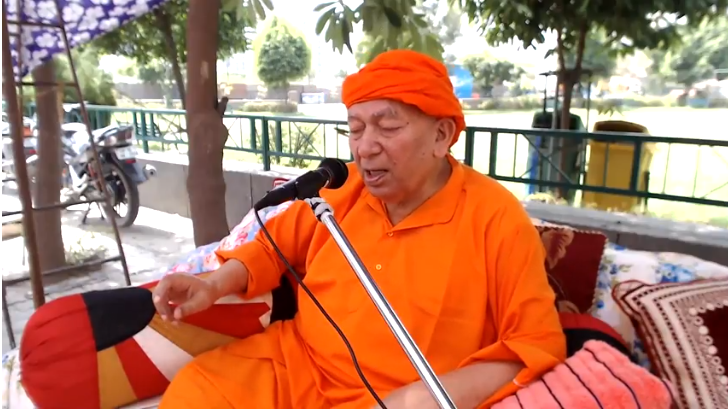
Attend the best deed as per Vedas
Yajyen
Schedule
Yajyen is performed daily in Ved Mandir. Public Yajyen is organised on every Sunday, Monday, Purnmasi and Amavasya. Additionally, it is organised on several occasions.
Annual Yajyen
Annual Yajyen is organised from April to June since 1979 with aahutis and discourse from every mantra of Vedas. It is done personally by Swami Ram Swarupji.
Please follow for regular updates
Visit Ved Mandir’s official YouTube Channel for Live Streaming of Yajyen, bhajans and other content
Updates
The channel is updated regularly.
More Content
More content is being added

Please follow for regular updates
Visit Swami Ram Swarup’s BHAJANS on YOUTUBE for high quality bhajans
Updates
The channel is updated regularly.
More Content
More content is being added
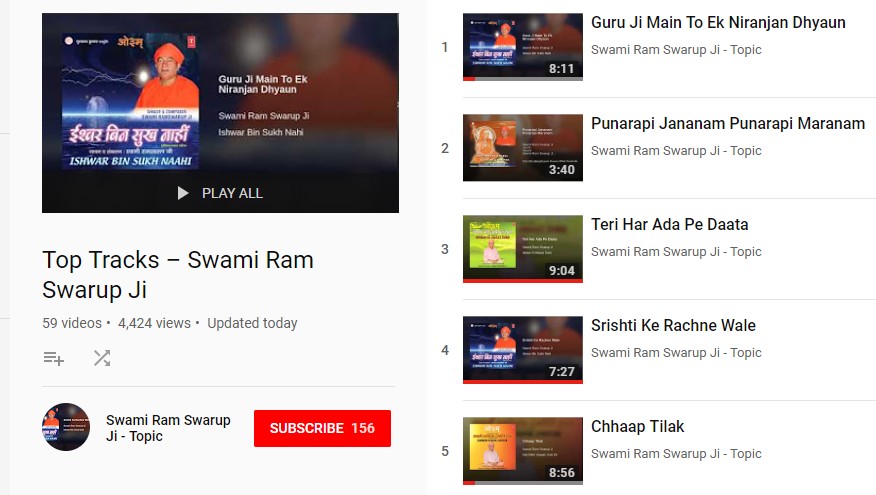
Publications by Swami Ram Swarupji
Vedic Books
Swamiji’s publications are available in Hindi, English, Sanskrit, Tamil, Telugu, Kannada, Gujarati, Marathi and other languages. These includes books and audio.
Geeta
Shrimad Bhagwadgeeta ek Vedic rahasya has explanation of each shloka of Geeta with the reference of Vedas.
Vedon se mrityu rahasye jaano
Vedon se Mrityu Rahasya Jano contains knowledge about death from Vedas, which is a bitter but fundamental truth.
Vedic Pravachan Sangrah
It has compilation of some basic knowledge of Vedas such has Maths, Science and others. It is a must read book. (2 Volumes)

